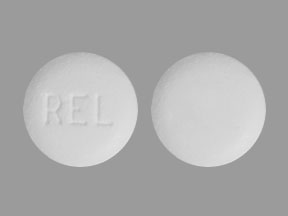
Relistor Coupons & Savings Card – Discount Prices from $2556.97
My prescription
Edit
150MG, Relistor (90 Tablets)
Select pharmacy

CVS
$2754.25
COUPON PRICE
Albertsons
$2556.97
COUPON PRICE
Walgreens
$2778.88
COUPON PRICE
Walmart
$2886.74
COUPON PRICERelistor savings card
Show this card to your pharmacist
Albertsons
$2556.97
BIN
ID
PCN
GRP
015995
LHKPT509208
GDC
DR33
Powered by
Related opioid antagonists prescriptions
More prescriptions for constipation
Related opioid antagonists prescriptions
More prescriptions for constipation
Price history for Relistor
90 Tablets, 150MG
Average retail price for Relistor
Average SaveHealth price for Relistor
Our price history data is based on aggregated prescription data collected from participating pharmacies in America. Our prescription data updates daily to reflect the latest price changes. If you notice a missing data point, it means there wasn't sufficient data available to generate a monetary value for that date.
*Retail prices are based on pharmacy claims data, and may not be accurate when we don't have enough claims.
Relistor dosage forms
Dosage Quantity Price from Per unit 150MG 90 Tablets $2778.88 $30.88
| Dosage | Quantity | Price from | Per unit |
|---|---|---|---|
| 150MG | 90 Tablets | $2778.88 | $30.88 |
Relistor Warnings
When using Relistor (methylnaltrexone), it is crucial to be aware of potential safety concerns. The following points outline important risks and precautions associated with this medication. If you have any questions or concerns, please consult your healthcare provider.
Gastrointestinal Injury: Relistor may rarely cause serious injuries to the gastrointestinal tract, such as perforations. This risk is heightened if you have existing gastrointestinal conditions like cancer, ulcers, inflammation, or Crohn's disease. Discuss the risks and benefits with your healthcare provider if you have these conditions. Should you experience severe, persistent abdominal pain, discontinue use and seek medical attention immediately.
Diarrhea: Severe, persistent diarrhea can occur with Relistor, potentially leading to dangerous dehydration. If you experience multiple instances of loose, watery stools, stop taking the medication and contact your healthcare provider promptly.
Opioid Withdrawal: Relistor may induce symptoms of opioid withdrawal, such as sweating, chills, diarrhea, abdominal pain, anxiety, irritability, and yawning. It may also reduce the effectiveness of opioid pain medications. If you notice withdrawal symptoms or diminished pain relief, speak with your healthcare provider for guidance.
Please ensure these precautions are carefully considered and discuss any concerns with your healthcare provider to ensure safe use of Relistor.
Relistor Side Effects
When taking this medication, you may experience some side effects, which are generally mild. Commonly reported side effects include abdominal pain, affecting 14-29% of users, diarrhea in 5-6%, and nausea, particularly with the injection form, in 9-12% of cases. These symptoms are typically manageable, but should they persist or worsen, it's important to inform your healthcare provider. In addition to these, other side effects have been observed, though they are less common. These can include headache, a feeling of abdominal bloating, vomiting, sweating, anxiety, muscle spasms, a runny nose, chills, hot flashes, tremors, and dizziness. While these may not be as frequent, you should report them to your healthcare provider if they occur. There are also rare but serious side effects associated with this medication that require immediate medical attention. Severe abdominal pain could indicate injury to the stomach or intestines, and severe diarrhea are both urgent issues. It's critical to seek medical help promptly if you experience these symptoms.
Relistor Interactions
When taking Relistor (methylnaltrexone), it's important to be aware of potential interactions with other medications:
Other Opioid Antagonists: Combining Relistor with other opioid antagonists, such as Naloxone or Naltrexone, can increase the risk of opioid withdrawal symptoms. These may include sweating, chills, diarrhea, abdominal pain, anxiety, and yawning. Therefore, concurrent use is generally not recommended.
Medications Metabolized by Cytochrome P450 Enzymes: Relistor does not significantly affect the metabolism of drugs processed by cytochrome P450 enzymes, including CYP2D6. This suggests a low likelihood of interactions with medications metabolized through this pathway.
Cimetidine: Cimetidine, a medication that inhibits certain drug transporters, can reduce the renal clearance of Relistor. However, this interaction results in only a minor increase in Relistor levels and is not considered clinically significant.
Food Interactions: For oral Relistor, food may reduce its absorption, potentially decreasing its effectiveness. It's recommended to take oral Relistor on an empty stomach at least 30 minutes before the first meal of the day.
Always inform your healthcare provider about all medications, supplements, and herbal products you are taking to ensure safe and effective use of Relistor.
What type of laxative is Relistor?
Relistor is a peripherally acting mu-opioid receptor antagonist (PAMORA). It is used to treat opioid-induced constipation by blocking the effects of opioids on the gut without affecting pain relief.
Can you buy Relistor over the counter?
Relistor is not available over the counter. It requires a prescription from a healthcare provider.
Can you take RELISTOR and Linzess together?
There are no known direct drug interactions between RELISTOR (methylnaltrexone) and Linzess (linaclotide). However, it is important for individuals to consult with their healthcare provider before taking these medications together. The healthcare provider can consider the individual's overall health condition and any other medications they may be taking to ensure safety and efficacy.
What class of drug is Relistor?
Relistor is classified as a peripherally acting mu-opioid receptor antagonist (PAMORA).
Do you have to eat after taking Relistor?
It is not necessary to eat after taking Relistor. Relistor can be taken with or without food, according to the prescribing information. However, if there are any specific instructions from a healthcare provider, those should be followed.
